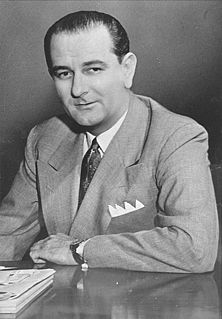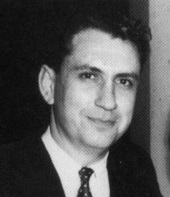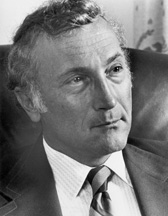
Joseph Sill Clark Jr. was an American author, lawyer and politician. A member of the Democratic Party, he served as the 116th Mayor of Philadelphia from 1952 to 1956 and as a United States Senator from Pennsylvania from 1957 to 1969. Clark was the only Unitarian Universalist elected to a major office in Pennsylvania in the modern era.

The 1980 United States Senate elections coincided with Ronald Reagan's victory in the presidential election. Reagan's large margin of victory over incumbent Jimmy Carter pulled in many Democratic voters and gave a huge boost to Republican Senate candidates.

The 1976 United States Senate elections was an election for the United States Senate that coincided with Democratic Jimmy Carter's presidential election and the United States Bicentennial celebration. Although almost half of the seats decided in this election changed parties, Carter's narrow victory did not provide coattails for the Democrats, and the balance of the chamber remained the same.

The 1974 United States Senate elections were held in the wake of the Watergate scandal, Richard M. Nixon's resignation from the presidency, and Gerald Ford's subsequent pardon of Nixon. Economic issues, specifically inflation and stagnation, were also a factor that contributed to Republican losses. Democrats made a net gain of three seats from the Republicans. Following the 1974 elections, the Democratic caucus controlled 60 seats and the Republican caucus controlled 39 seats.

The 1970 United States Senate elections was an election for the United States Senate, taking place in the middle of Richard Nixon's first term as President. The Democrats lost a net of three seats, while the Republicans and the Conservative Party of New York picked up one net seat each, and former Democrat Harry F. Byrd Jr. was re-elected as an independent.

The 1968 United States Senate elections were elections for the United States Senate which coincided with the presidential election. Although Richard Nixon won the presidential election narrowly, the Republicans picked up five net seats in the Senate. Republicans would gain another seat after the election when Alaska Republican Ted Stevens was appointed to replace Democrat Bob Bartlett.

The 1964 United States Senate elections coincided with the election of President Lyndon B. Johnson by an overwhelming majority, to a full term. His Democratic Party picked up a net two seats from the Republicans. As of 2019, this is the last time either party has had a two-thirds majority in the Senate, which would have hypothetically allowed the Senate Democrats to override a veto, convict and expel certain officials, or invoke cloture without any votes from Republicans. The Senate election coincided with Democratic gains in the House in the same year.

The 1956 United States Senate elections were elections for the United States Senate that coincided with the re-election of President Dwight D. Eisenhower. Although the Democrats gained two seats in regular elections, the Republicans gained back two seats in special elections, leaving the party balance of the chamber remained unchanged.

The 1950 United States Senate elections occurred in the middle of Harry S. Truman's second term as President. As with most 20th-century second-term mid-terms, the party out of the Presidency made significant gains. The Republican opposition made a net gain of five seats, taking advantage of the Democratic administration's declining popularity during the Cold War and the aftermath of the Recession of 1949. The Democrats held a narrow 49 to 47 seat majority after the election. This became the first time since 1932 that the Senate Majority Leader lost his seat and the only instance where the majority leader lost his seat while his party retained the majority.

The 1996 United States Senate election in Alabama was held on November 5, 1996. Incumbent Democratic U.S. Senator Howell Heflin decided to retire. Republican Jeff Sessions won the open seat, becoming just the second Republican U.S. Senator elected to represent Alabama since Reconstruction.

The 1980 United States Senate election in Pennsylvania was held on November 4, 1980. Incumbent Republican U.S. Senator Richard Schweiker decided to retire, instead of seeking a third term. Republican nominee Arlen Specter won the open seat, defeating Democratic nominee Peter F. Flaherty.

The 2012 United States Senate election in Pennsylvania was held on November 6, 2012, alongside a presidential election, other elections to the United States Senate in other states, as well as elections to the United States House of Representatives and various state and local elections. Incumbent Democratic U.S. Senator Bob Casey, Jr. ran for and won re-election to a second term, defeating Republican nominee Tom Smith, and Libertarian nominee Rayburn Smith.

The 1968 United States elections was held on November 5, and elected members of the 91st United States Congress. The election took place during the Vietnam War, in the same year as the Tet Offensive, the assassination of Martin Luther King, Jr., and the protests of 1968. The Republican Party won control of the presidency and picked up seats in the House and Senate, although the Democratic Party retained control of Congress.

The 1974 United States Senate election in Pennsylvania was held on November 5, 1974. Incumbent Republican U.S. Senator Richard Schweiker won re-election, defeating Democratic nominee Peter F. Flaherty.

The 1962 United States Senate election in Pennsylvania was held on November 6, 1962. Incumbent Democratic U.S. Senator Joseph S. Clark, Jr. successfully sought re-election to another term, defeating Republican nominee James E. Van Zandt. A Democratic U.S. Senator would not be re-elected in Pennsylvania again until 2012. As of 2019, this is the last time the Democrats have won the Class 3 Senate Seat from Pennsylvania.

The 1956 United States Senate election in Pennsylvania was held on November 6, 1956. Incumbent Republican U.S. Senator James H. Duff sought re-election to another term, but was defeated by the Democratic nominee, Joseph S. Clark, Jr.

The 1958 United States Senate elections in Arizona took place on November 4, 1958. Incumbent Republican U.S. Senator Barry Goldwater ran for reelection to a second term, and defeated former U.S. Senator, and then-Governor, Ernest McFarland in the general election. The election was a virtual rematch from 1952, where Goldwater defeated McFarland by a narrow margin. Goldwater had attributed the win to the unpopularity of President Harry S. Truman and popular Wisconsin Senator Joseph McCarthy endorsing his campaign.

The 1982 United States Senate election in Indiana was held on November 2, 1982. Incumbent Republican United States Senator Richard Lugar faced Democratic United States Representative Floyd Fithian in the general election. Lugar won with a margin of 53% of the vote, compared to Fithian's 46%.

The 1968 United States Senate election in Illinois was held on November 5, 1968, to elect one of Illinois's members to the United States Senate. Incumbent Republican U.S. Senator and Minority Leader Everett Dirksen won re-election to his fourth term.
















